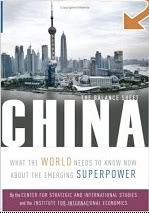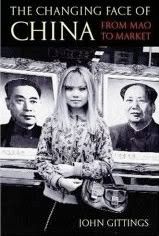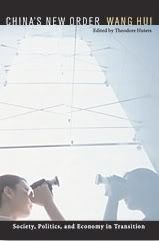The Transition from State to Private Capitalism in China
Strange Bedfellows?
The Transition from State to Private Capitalism in China: The Network of Distributive Class Payments, Modernization, and Growth of the " New Social Strata": Is Capitalism in China to Stay?
Satya J. Gabriel
" "Since China adopted the policy of reform and opening-up, the composition of China's social strata has changed to some extent. There are, among others, entrepreneurs and technical personnel employed by scientific and technical enterprises of the non-public sector, managerial and technical staff employed by foreign-funded enterprises, the self-employed, private entrepreneurs, employees in intermediaries and free-lance professionals. . . . Most of these people in the new social strata (emphasis added) have contributed to the development of productive forces and other undertakings in a socialist society through honest labor and work or lawful business operation. They work together with workers, farmers, intellectuals, cadres and the officers and men of the PLA. They are also working for building socialism with Chinese characteristics.""
Jiang Zemin, from his speech at the meeting celebrating the 80th anniversary of the founding of the CPC.
There has been a proliferation of alternative types of economic organizations within the Chinese economy since the beginning of the reforms in 1978/1979. It started out as illegal to engage in a wide range of entrepreneurial activities and has evolved into a relatively wide open environment where many individuals engage in self-employment (the ancient class process whereby the person creating value is also the first receiver of that value) and an increasing number hire others to produce value in capitalist firms. Indeed, not only are new capitalist firms being started at an increasing rate (with the red tape associated with starting a business having declined much faster than anyone expected), but the older state capitalist firms have been morphing into private capitalist firms, creating a tidal shift in control over surplus value (both in terms of decentralization and de-statization). But China has gone through a number of sea-changes in class terms since the 1949 Revolution. Why are we to believe that this current sea-change is more permanent than past ones?
We can't be sure. But there are indications that not only are capitalism and self-employment (ancientism) becoming deeply rooted in the Chinese economy but that, as indicated above, the prevalent form of capitalism has shifted from a state to a private form. And as private capitalism grows, it creates a dynamic that fosters further growth, displacing its cousin state variant form of capitalism, as well as alternative class processes, including self-employment.
Capitalism in contemporary China is manifest in a rich array of private, municipal, and state-owned capitalist firms (and hybrid firms, such as joint ventures). As has been pointed out in previous essays, the state and municipal owned firms have increasing taken on many of the characteristics of their privately owned cousins. While all capitalist firms share a common form of surplus value creation, appropriation, and distribution, state capitalist firms have been defined (Stephen A. Resnick and Richard D. Wolff, Class Theory and Practice) as a form of capitalism wherein the firm is an integral part of the state bureaucracy and the appropriators of surplus value are state-appointed functionaries. This is a stricter definition than one I had been using. I had previously defined state capitalism as simply the marriage of capitalism and state-ownership. But I would agree with Resnick and Wolff that this stricter definition makes a lot of sense. It does get to the heart of the material difference between state and private capitalism, which is not simply ownership, but the issue of relative autonomy. A state capitalist firm is simply a component in a larger bureaucratic structure, with objectives and activities constructed in the context of the goals of the larger bureaucracy. The state capitalist firm enters into agreements only if those agreements are consistent with the dictates of the bureaucracy. Thus, commitments of future surplus value are made in this context. This reduces the likelihood of creating allegiances and actions by internal and external agents that would undermine the state form of capitalism (although this is not guaranteed).
But what of the firm that is merely state owned, but has been separated from/is independent of the bureaucratic structure. In particular, what happens when the Chinese SOEs are transitioned to corporations where the government is simply an owner (and often not the sole owner) but the board of directors and senior management are no longer state functionaries? This has clear implications for the operational decisions made within the firm and the nature and extent of the binding agreements linking the enterprise to receivers of surplus value within and without the enterprise. Indeed, a firm can be state-owned and yet have an independent ability to enter into such binding agreements that result in future claims on enterprise surplus value so long as the senior management and/or board of directors (depending on the legal context of the firm's operations) are not state functionaries (subject to the commands of the state bureaucratic hierarchy).
The restructuring of the state-owned enterprise (SOE) sector has quite definitely resulted in a shift from these enterprises being a functional part of the government bureaucracy (under the State Council (with management functions delegated to the State-owned Assets Bureau)) to being relatively autonomous corporations where the state is simply a majority (and external) shareowner.[1] SOE senior management is engaged in making the sorts of binding contracts that one would expect from a private capitalist firm. Using the strict Resnick-Wolff definition of state capitalism, China has already undergone a transition from state capitalism to private capitalism (after having earlier, even if recently, undergone a transition from feudalism to state capitalism in industry and feudalism to ancientism/self-employment and capitalism in agriculture).
To the point, boards of directors of state-owned corporations have become the first receivers of the surplus value generated in those enterprises and are responsible for entering into contractual relationships that shape the investment portfolio and operational strategy of the enterprises and future claims to enterprise surplus value. The fact that boards of directors and their senior management must do this in the context of policies set by the state does not change the fact that the agents responsible for such decision-making are no longer state bureaucrats. After all, all private capitalist enterprises, no matter where in the world they function, are subject to such contexts.
The power to shape the binding agreements and surplus value commitments of the SOE makes it possible for SOE boards of directors to secure conditions for the existence of this new form of capitalism, to reproduce it over time, and perhaps even to expand and enhance it. Thus, the restructuring of SOEs from inside the state bureaucracy to outside this bureaucracy has far reaching implications for the future direction of reform. In other words, the very fact of the relative autonomy of boards of directors gives the boards powers to shape Chinese society in ways that weaken the power of the state to alter the initial conditions that gave the boards their relative autonomy in the first place.
The glue linking the objectives of the capitalist enterprise to internal and external agents is the distributive payment of surplus value, where the board of directors shares surplus value with these agents in return for the agents taking actions necessary to the reproduction of the boards' ability to continue receiving surplus value. The spread of private forms of capitalism, including state owned firms with private appropriators, results in the creation of an expanding web of such relationships. As private capitalist firms become more pervasive in China, the behavior of these agents who receive capitalist surplus value from private capitalist firms will become increasingly important factors in the overall social life of China. The creation of this distributive relationship between private capitalist firms in China and both internal and external agents allows for the coordination of actions designed to foster a pro-private-capitalism Chinese social formation (in the form of pro-private-capitalist cultural, economic, and political policies originating from a wide range of social sites, including the various levels of government/state).
As local officials fall under the spell of these distributive payments out of private capitalist surplus value, there will be a stronger tendency for those officials to act in defiance of goals and objectives set in Beijing when such goals and objectives are contrary to the conditions necessary for the health and prosperity of private capitalism. In other words, the creation of a distributive class relationship between local governments and private capitalist enterprises makes it all the more difficult for the central government in China to assert its primacy over public policies. This is, then, one of the forces generating a higher level of regionalism and localism in China.
The coalescence of power in the corporate sector is reinforced by the absence of independent labor unions. Chinese corporations operate in an environment where the wage laborers generating the necessary surplus to meet the aforementioned internal and external demands and secure close ties to external agents are relatively weak, represented in collective bargaining by branches of the All China Federation of Trade Unions (ACFTU), a government controlled entity that is, for all intents and purposes, a component of the state bureaucracy. The cooperation of the ACFTU with internal management of majority state owned enterprises facilitates keeping rates of exploitation relatively high and providing a means for making these firms more competitive as the Chinese economy is opened to external competition, as well as increased varieties of internal competition.
Let's not lose sight of the original motivation for the Communist Party of China (CPC), under the leadership of the conservative pragmatists, taking a pro-private-capitalist approach. The goal was to generate sufficient surplus value to speed-up the modernization of Chinese industry, the military, research and development, and agriculture (The Four Modernizations). The fact that private capitalism has produced relatively large increases in surplus value, with average annual growth rates approaching ten per cent, has provided the main evidence for the correctness of the pragmatic conservative approach and reinforced their hold over the CPC leadership. Rapid growth coupled with the extensive network of relationships created by continual expansion of the distributive class process of private capitalism work in tandem to reinforce the reform strategy and to create more allegiances to that strategy.
It is generally understood that one of those allies is the group that Jiang Zemin has labeled "the new social strata." How do we make sense of the new social strata in class terms? It is, in fact, this process of creating a network of receivers of surplus value distributions and the related activities of agents within that network that constitutes an alternative way of thinking of the new social strata (which includes some elements of the often referred to "middle class," but is not reducible to that income defined grouping). In discussions of the "middle class," it is usually understood that this subset of the population is more supportive of modernity than the poorer segments (or subsets not connected to capitalism by surplus value distributions) and less concerned with social welfare. This can also be said of Zemin's new social strata. Thus, as the pragmatic conservatives shift the standard of Party success from "the iron rice bowl" (or providing broadly available social services) and egalitarian income distribution (both of which had been interpreted by the Maoist Left as signs of socialism) to generating the surplus value necessary to modernization, the pragmatic conservatives might also be attempting to shift the core constituency of the Party from the poor and working classes to this new social strata, as well as the composite elite of private capitalists and top-level government officials. It remains to be seen if the implicit bargain between the pragmatic conservative led state bureaucracy, local governments, and private capitalist directors and managers will result in a better society for all Chinese citizens ("xia gang she hui"). The early phase of modernization has produced certain physical artifacts of modernity, such as new skylines in Chinese cities, a magnetic levitation train in Shanghai, an explosion of automobiles on the new freeways, new airports, one of the fastest rates of absolute increase in cell phone and internet usage on the planet, a rapidly developing (and heavily subsidized) electronics industry, among other things, but it has been accompanied by increasing income inequality[2] , social unrest related to retrenchment at SOEs, increased corruption at local governmental levels and charges of high level corruption at the top of the state bureaucracy, organized protests by ancient farmers who feel pressured by everything from the just mentioned corruption by local officials to higher costs for inputs and increased competition from capitalist farms, and a deterioration in public health care provision (with SARS as a possible side-effect). There is some concern that the latter set of factors could drown out the former and lead to social chaos and political instability at some point in the future. But this may just be wishful thinking from that other cottage industry --- mainstream social analysts mimicking classical Marxists by seeing a crisis looming around every corner. The difference is that the Marxists tend to see these crises in capitalist social formations, in general, (or sometimes only in the most technologically advanced capitalist nations) and the former group only sees this omnipresent crisis potential in China.
Satya J. Gabriel, Professor of Economics Mount Holyoke College.
NOTES:
[1]Ironically, the transition from state capitalist to private (but state-owned) capitalist may have resulted in a relative deterioration in the performance of many large and medium-sized firms. Dic Lo, 1997, Market and Institutional Regulation in Chinese Industrialization, 1978-1994, found that these sized firms did just as well as private firms, in terms of productive efficiency, during the period prior to the mid 1990s, which would include the period when they were first transitioned from state-run to simply state-owned, indicating that something happened during the transitional period to lead to their relative underperformance. Perhaps it was less a deterioration in the performance of these transitioned firms than the development of closer ties between public authorities and the newer private firms that resulted in the performance shift, as the latter were able to secure conditions for prosperity at the expense of the older (formerly state-run) firms.
June 2003.
Link




0 Comments:
Post a Comment
Subscribe to Post Comments [Atom]
<< Home